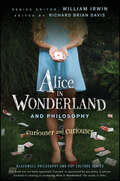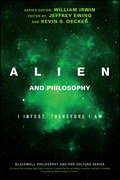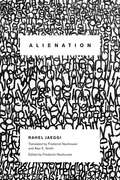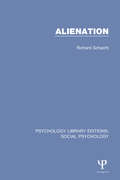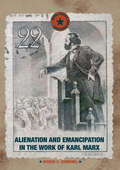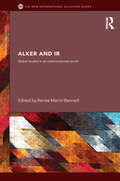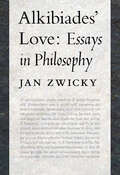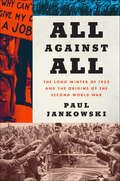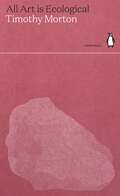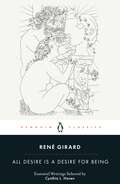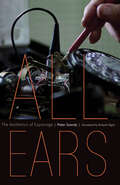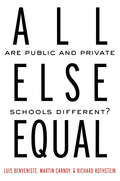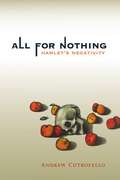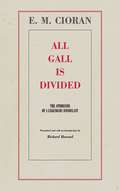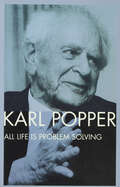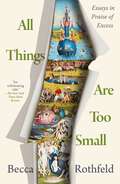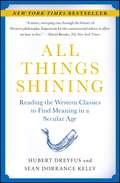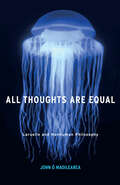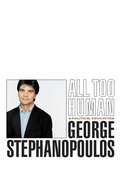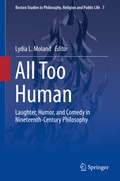- Table View
- List View
Algorithms of Education: How Datafication and Artificial Intelligence Shape Policy
by Kalervo N. Gulson P. Taylor Webb Sam SellarA critique of what lies behind the use of data in contemporary education policy While the science fiction tales of artificial intelligence eclipsing humanity are still very much fantasies, in Algorithms of Education the authors tell real stories of how algorithms and machines are transforming education governance, providing a fascinating discussion and critique of data and its role in education policy.Algorithms of Education explores how, for policy makers, today&’s ever-growing amount of data creates the illusion of greater control over the educational futures of students and the work of school leaders and teachers. In fact, the increased datafication of education, the authors argue, offers less and less control, as algorithms and artificial intelligence further abstract the educational experience and distance policy makers from teaching and learning. Focusing on the changing conditions for education policy and governance, Algorithms of Education proposes that schools and governments are increasingly turning to &“synthetic governance&”—a governance where what is human and machine becomes less clear—as a strategy for optimizing education.Exploring case studies of data infrastructures, facial recognition, and the growing use of data science in education, Algorithms of Education draws on a wide variety of fields—from critical theory and media studies to science and technology studies and education policy studies—mapping the political and methodological directions for engaging with datafication and artificial intelligence in education governance. According to the authors, we must go beyond the debates that separate humans and machines in order to develop new strategies for, and a new politics of, education.
Alice in Wonderland and Philosophy
by William Irwin Richard Brian DavisThe perfect companion to Lewis Carroll's classic book and director Tim Burton's March 2010 remake of Alice in WonderlandAlice?s Adventures in Wonderland has fascinated children and adults alike for generations. Why does Lewis Carroll introduce us to such oddities as blue caterpillars who smoke hookahs, cats whose grins remain after their heads have faded away, and a White Queen who lives backwards and remembers forwards? Is it all just nonsense? Was Carroll under the influence? This book probes the deeper underlying meaning in the Alice books, and reveals a world rich with philosophical life lessons. Tapping into some of the greatest philosophical minds that ever lived?Aristotle, Hume, Hobbes, and Nietzsche?Alice in Wonderland and Philosophy explores life?s ultimate questions through the eyes of perhaps the most endearing heroine in all of literature. Looks at compelling issues such as perception and reality as well as how logic fares in a world of lunacy, the Mad Hatter, clocks, and temporal passageOffers new insights into favorite Alice in Wonderland characters and scenes, including the Mad Hatter and his tea party, the violent Queen of Hearts, and the grinning Cheshire CatAccessible and entertaining, Alice in Wonderland and Philosophy will enrich your experience of Alice's timeless adventures with new meaning and fun.
Alien Phenomenology, or What It’s Like to Be a Thing (Posthumanities)
by Ian BogostHumanity has sat at the center of philosophical thinking for too long. The recent advent of environmental philosophy and posthuman studies has widened our scope of inquiry to include ecosystems, animals, and artificial intelligence. Yet the vast majority of the stuff in our universe, and even in our lives, remains beyond serious philosophical concern. In Alien Phenomenology, or What It&’s Like to Be a Thing, Ian Bogost develops an object-oriented ontology that puts things at the center of being—a philosophy in which nothing exists any more or less than anything else, in which humans are elements but not the sole or even primary elements of philosophical interest. And unlike experimental phenomenology or the philosophy of technology, Bogost&’s alien phenomenology takes for granted that all beings interact with and perceive one another. This experience, however, withdraws from human comprehension and becomes accessible only through a speculative philosophy based on metaphor.Providing a new approach for understanding the experience of things as things, Bogost also calls on philosophers to rethink their craft. Drawing on his own background as a videogame designer, Bogost encourages professional thinkers to become makers as well, engineers who construct things as much as they think and write about them.
Alien and Philosophy: I Infest, Therefore I Am (The Blackwell Philosophy and Pop Culture Series)
by William IrwinAlien and Philosophy: I Infest, Therefore I Am presents a philosophical exploration of the world of Alien, the simultaneously horrifying and thought-provoking sci-fi horror masterpiece, and the film franchise it spawned. The first book dedicated to exploring the philosophy raised by one of the most successful and influential sci-fi franchises of modern times Features contributions from an acclaimed team of scholars of philosophy and pop culture, led by highly experienced volume editors Explores a huge range of topics that include the philosophy of fear, Just Wars, bio-weaponry, feminism and matriarchs, perfect killers, contagion, violation, employee rights and Artificial Intelligence Includes coverage of H.R. Giger’s aesthetics, the literary influences of H.P. Lovecraft, sci-fi and the legacy of Vietnam, and much more!
Alienation
by Frederick Neuhouser Alan E. Smith Rahel JaeggiThe Hegelian-Marxist idea of alienation fell out of favor during the post-metaphysical rejection of humanism and essentialist views of human nature. In this book Jaeggi draws on phenomenological analyses grounded in modern conceptions of agency, along with recent work in the analytical tradition, to reconceive of alienation as the absence of a meaningful relationship to oneself and others, which manifests itself in feelings of helplessness and the despondent acceptance of ossified social roles and expectations.A revived approach to alienation helps critical social theory engage with phenomena, such as meaninglessness, isolation, and indifference, which have broad implications for issues of justice. By severing alienation's link to a problematic conception of human essence while retaining its social-philosophical content, Jaeggi provides resources for a renewed critique of social pathologies, a much-neglected concern in contemporary liberal political philosophy. Her work revisits the arguments of Rousseau, Hegel, Kierkegaard, and Heidegger, placing them in dialogue with Thomas Nagel, Bernard Williams, and Charles Taylor.
Alienation
by Frederick Neuhouser Alan E. Smith Rahel JaeggiThe Hegelian-Marxist idea of alienation fell out of favor during the post-metaphysical rejection of humanism and essentialist views of human nature. In this book Jaeggi draws on phenomenological analyses grounded in modern conceptions of agency, along with recent work in the analytical tradition, to reconceive of alienation as the absence of a meaningful relationship to oneself and others, which manifests itself in feelings of helplessness and the despondent acceptance of ossified social roles and expectations.A revived approach to alienation helps critical social theory engage with phenomena, such as meaninglessness, isolation, and indifference, which have broad implications for issues of justice. By severing alienation's link to a problematic conception of human essence while retaining its social-philosophical content, Jaeggi provides resources for a renewed critique of social pathologies, a much-neglected concern in contemporary liberal political philosophy. Her work revisits the arguments of Rousseau, Hegel, Kierkegaard, and Heidegger, placing them in dialogue with Thomas Nagel, Bernard Williams, and Charles Taylor.
Alienation (New Directions in Critical Theory #4)
by Rahel JaeggiThe Hegelian-Marxist idea of alienation fell out of favor after the postmetaphysical rejection of humanism and essentialist views of human nature. In this book Rahel Jaeggi draws on the Hegelian philosophical tradition, phenomenological analyses grounded in modern conceptions of agency, and recent work in the analytical tradition to reconceive alienation as the absence of a meaningful relationship to oneself and others, which manifests in feelings of helplessness and the despondent acceptance of ossified social roles and expectations.A revived approach to alienation helps critical social theory engage with phenomena such as meaninglessness, isolation, and indifference. By severing alienation's link to a problematic conception of human essence while retaining its social-philosophical content, Jaeggi provides resources for a renewed critique of social pathologies, a much-neglected concern in contemporary liberal political philosophy. Her work revisits the arguments of Rousseau, Hegel, Kierkegaard, and Heidegger, placing them in dialogue with Thomas Nagel, Bernard Williams, and Charles Taylor.
Alienation (Psychology Library Editions: Social Psychology)
by Richard SchachtFirst published in 1970, original blurb: ‘Alienation’ is the catchword of our time. It has been applied to everything from the new politics to the anti-heroes of today’s films. But what does it mean to say that someone is alienated? Is alienation a state of mind, or a relationship? If modern man is indeed alienated, is it from his work, his government, his society, or himself – or from all of these? Richard Schacht, in this intelligent analysis, gets to the root of these questions. Examining the concept of alienation in the works of Hegel and Marx, he gives a clear account of the origins of the modern usage of the term. Among the many insights to be gained from this analysis is a clear understanding of Hegel’s influence on Marx in this most crucial area. Mr Schacht goes on to discuss the concept of alienation in recent philosophical and sociological literature, particularly in the writings of Erich Fromm. Here he finds a great deal of confusion, which has resulted in a series of almost universally unquestioned misconceptions. This, then, is a book for all of us who use – and mis-use – the term ‘alienation’, and who are interested in the concepts it brings to mind. The arguments of Professor Walter Kaufmann’s introductory essay provide a useful background for Mr Schacht’s analysis. In this essay, Professor Kaufmann states that ‘henceforth nobody should write about alienation without first reading Schacht’s book.’
Alienation and Emancipation in the Work of Karl Marx (Marx, Engels, and Marxisms)
by George C. ComninelThis book considers Karl Marx’s ideas in relation to the social and political context in which he lived and wrote. It emphasizes both the continuity of his commitment to the cause of full human emancipation, and the role of his critique of political economy in conceiving history to be the history of class struggles. The book follows his developing ideas from before he encountered political economy, through the politics of 1848 and the Bonapartist “farce,”, the maturation of the critique of political economy in the Grundrisse and Capital, and his engagement with the politics of the First International and the legacy of the Paris Commune. Notwithstanding errors in historical judgment largely reflecting the influence of dominant liberal historiography, Marx laid the foundations for a new social theory premised upon the historical consequences of alienation and the potential for human freedom.
Alienation and Nature in Environmental Philosophy
by Simon HailwoodMany environmental scientists, scholars and activists characterise our situation as one of alienation from nature, but this notion can easily seem meaningless or irrational. In this book, Simon Hailwood critically analyses the idea of alienation from nature and argues that it can be a useful notion when understood pluralistically. He distinguishes different senses of alienation from nature pertaining to different environmental contexts and concerns, and draws upon a range of philosophical and environmental ideas and themes including pragmatism, eco-phenomenology, climate change, ecological justice, Marxism and critical theory. His novel perspective shows that different environmental concerns - both anthropocentric both anthropocentric and nonanthropocentric - can dovetail, rather than compete with, each other, and that our alienation from nature need not be something to be regretted or overcome. His book will interest a broad readership in environmental philosophy and ethics, political philosophy, geography and environmental studies.
Alker and IR: Global Studies in an Interconnected World (New International Relations)
by Renée Marlin-BennettInternational Relations have rarely been considered a synthesis of humanistic and social sciences approaches to understand the complex connections of a global, and globalizing, world. One of the few scholars to have accomplished this creative blend was Hayward R. Alker. Alker and IR presents a set of visionary and original essays from scholars who have been profoundly influenced by Alker's approach to global studies. They build on the foundation he laid, demonstrating the practicality and usefulness of ethically grounded, theoretically informed and interdisciplinary research for producing knowledge. They show how substantive boundaries can be crossed and methodological rules rewritten in the search for a deeper, more contextualized approach to global politics. This book will be of interest to researchers and students of international relations and global politics.
Alkibiades' Love
by Jan ZwickyAlkibiades, a central character in Plato's Symposium, claims that philosophy touches him to the quick. When Socrates speaks, he's often moved to tears and realizes he must change his life. In Alkibiades' Love, Jan Zwicky demonstrates that this image of philosophy is not anachronistic, but remains the living heart of the discipline. Philosophy can indeed matter to our lives, but for it to do so, we must reconceive the methods that, since the Enlightenment, have dominated its self-image in the West. In these meticulously researched essays, Zwicky argues that analytic and poststructuralist philosophy are not simply fashions in academic discourse, but are manifestations of the technocracy which they sustain and promote. The alternative she develops, by showing it in action, is lyric philosophy - an integrated mode of understanding whose foundations lie in the way we comprehend music and metaphor. Written in lucid and powerful prose, Alkibiades' Love will interest a broad readership, from students of ancient Greek philosophy to ecologists seeking a coherent foundation for their work. Zwicky offers deep and original readings of Freud, Plato, and Simone Weil, and resuscitates Max Wertheimer's work, linking it to our comprehension of mathematics, metaphor, and ecological structures. Zwicky has been hailed as one of the most important and original thinkers of our time. Alkibiades' Love illuminates and extends her groundbreaking work while providing an accessible introduction for those coming to her thought for the first time.
All Against All: The Long Winter of 1933 and the Origins of the Second World War
by Paul Jankowski“This crisply written, well-documented account . . . examines diplomatic, military, political and economic developments in a crucial period leading up to WWII” (Publishers Weekly)All Against All is the story of how a single winter, between November 1932 and April 1933, put the postwar world back on the path to global conflict. Historian Paul Jankowski reveals how domestic passions within various nations colluded to drive their governments towards a war few of them wanted and none of them could control.Over these six months, collective delusions took hold in both liberal and authoritarian regimes. Hitler came to power; Japan invaded Jehol and left the League of Nations; Mussolini looked towards Africa; Roosevelt was elected; France changed governments three times; and the victors of the Great War fell out acrimoniously over war debts, arms, currency, tariffs, and Germany. A world economic conference offered hope, only to collapse when the US went its own way.All Against All reconstructs a series of seemingly disparate happenings whose connections can only be appraised in retrospect. As he weaves these stories together, Jankowski offers a cautionary tale for our times. While we do not know for certain where today’s crises will take us, we do know that those of the 1930s culminated in the Second World War.
All Art is Ecological (Green Ideas)
by Timothy MortonIn twenty short books, Penguin brings you the classics of the environmental movement.Provocative and playful, All Art is Ecological explores the strangeness of living in an age of mass extinction, and shows us that emotions and experience are the basis for a deep philosophical engagement with ecology.Over the past 75 years, a new canon has emerged. As life on Earth has become irrevocably altered by humans, visionary thinkers around the world have raised their voices to defend the planet, and affirm our place at the heart of its restoration. Their words have endured through the decades, becoming the classics of a movement. Together, these books show the richness of environmental thought, and point the way to a fairer, saner, greener world.
All Desire is a Desire for Being
by René GirardA new selection of foundational works from the influential philosopher who developed the theory of mimetic desireWhy do humans have such a remarkable capacity for conflict? From ancient foundational myths to the modern era, the visionary thinker Rene Girard identified the constant, competing desires at the heart of our existence - desires that we copy from others, igniting a contagious violence. This remarkable and accessible new selection of Girard's work shows him as a writer for our times, as he ranges over human imitation and rivalry, herd behaviour, scapegoating and how our violent longings play out in stories, from Shakespeare to religion. 'The explosion of social media, the resurgence of populism, and the increasing virulence of reciprocal violence all suggest that the contemporary world is becoming more and more recognizably "Girardian" in its behaviour' The New York Review of BooksEdited with an Introduction by Cynthia L. Haven
All Ears: The Aesthetics of Espionage
by Peter SzendyThe world of international politics has recently been rocked by a seemingly endless series of scandals involving auditory surveillance: the NSA’s warrantless wiretapping is merely the most sensational example of what appears to be a universal practice today. What is the source of this generalized principle of eavesdropping?All Ears: The Aesthetics of Espionage traces the long history of moles from the Bible, through Jeremy Bentham’s “panacoustic” project, all the way to the intelligence-gathering network called “Echelon.” Together with this archeology of auditory surveillance, Szendy offers an engaging account of spycraft’s representations in literature (Sophocles, Shakespeare, Joyce, Kafka, Borges), opera (Monteverdi, Mozart, Berg), and film (Lang, Hitchcock, Coppola, De Palma). Following in the footsteps of Orpheus, the book proposes a new concept of “overhearing” that connects the act of spying to an excessive intensification of listening. At the heart of listening Szendy locates the ear of the Other that manifests itself as the originary division of a “split-hearing” that turns the drive for mastery and surveillance into the death drive.
All Else Equal: Are Public and Private Schools Different?
by Martin Carnoy Richard Rothstein Luis BenvenistePrivate schools always provide a better education than public schools. Or do they? Inner-city private schools, most of which are Catholic, suffer from the same problems neighboring public schools have including large class sizes, unqualified teachers, outdated curricula, lack of parental involvement and stressful family and community circumstances. Straightforward and authoritative, All Else Equal challenges us to reconsider vital policy decisions and rethink the issues facing our current educational system.
All For Nothing
by Andrew CutrofelloHamlet as performed by philosophers, with supporting roles played by Kant, Nietzsche, and others.
All Gall is Divided: The Aphorisms of a Legendary Iconoclast
by Richard Howard E. M. CioranE. M. Cioran lived on the margins of the modern world. Like his friends Beckett and Ionesco, he stood apart from all the official trappings of his chosen medium of philosophy. Not since Nietzsche has a thinker revealed himself so drastically. All Gall Is Divided is a breviary of estrangement that rejoices in the contradictions and confusions of human fate. As his translator Richard Howard remarks, "You fraternize with Emil Cioran at your peril, but it is the kind of danger that keeps you alive."
All Life is Problem Solving
by Karl Popper'Never before has there been so many and such dreadful weapons in so many irresponsible hands.' - Karl Popper, from the PrefaceAll Life is Problem Solving is a stimulating and provocative selection of Popper's writings on his main preoccupations during the last twenty-five years of his life. This collection illuminates Popper's process of working out key formulations in his theory of science, and indicates his view of the state of the world at the end of the Cold War and after the collapse of communism.
All Things Are Too Small: Essays in Praise of Excess
by Becca RothfeldA glorious call to throw off restraint and balance in favor of excess, abandon, and disproportion, in essays ranging from such topics as mindfulness, decluttering, David Cronenberg, and consent.In her debut essay collection, “brilliant and stylish” (The Washington Post) critic Becca Rothfeld takes on one of the most sacred cows of our time: the demand that we apply the virtues of equality and democracy to culture and aesthetics. The result is a culture that is flattened and sanitized, purged of ugliness, excess, and provocation.Our embrace of minimalism has left us spiritually impoverished. We see it in our homes, where we bring in Marie Kondo to rid them of their idiosyncrasies and darknesses. We take up mindfulness to do the same thing to our heads, emptying them of the musings, thoughts, and obsessions that make us who we are. In the bedroom, a new wave of puritanism has drained sex of its unpredictability and therefore true eroticism. In our fictions, the quest for balance has given us protagonists who aspire only to excise their appetites. We have flipped our values, Rothfeld argues: while the gap between rich and poor yawns hideously wide, we strive to compensate with egalitarianism in art, erotics, and taste, where it does not belong and where it quashes wild experiments and exuberance.Lush, provocative, and bitingly funny, All Things Are Too Small is a subversive soul cry to restore imbalance, obsession, gluttony, and ravishment to all domains of our lives.
All Things Shining: Reading the Western Classics to Find Meaning in a Secular Age
by Hubert Dreyfus Sean Dorrance KellyIn unrelenting flow of choices confronts us at nearly every moment of our lives, and yet our culture offers us no clear way to choose. This predicament seems inevitable, but in fact it's quite new. In medieval Europe, God's calling was a grounding force. In ancient Greece, a whole pantheon of shining gods stood ready to draw an appropriate action out of you. Like an athlete in "the zone," you were called to a harmonious attunement with the world, so absorbed in it that you couldn't make a "wrong" choice. If our culture no longer takes for granted a belief in God, can we nevertheless get in touch with the Homeric moods of wonder and gratitude, and be guided by the meanings they reveal? All Things Shining says we can.Hubert Dreyfus and Sean Dorrance Kelly illuminate some of the greatest works of the West to reveal how we have lost our passionate engagement with and responsiveness to the world. Their journey takes us from the wonder and openness of Homer's polytheism to the monotheism of Dante; from the autonomy of Kant to the multiple worlds of Melville; and, finally, to the spiritual difficulties evoked by modern authors such as David Foster Wallace and Elizabeth Gilbert.Dreyfus, a philosopher at the University of California, Berkeley, for forty years, is an original thinker who finds in the classic texts of our culture a new relevance for people's everyday lives. His lively, thought-provoking lectures have earned him a podcast audience that often reaches the iTunesU Top 40. Kelly, chair of the philosophy department at Harvard University, is an eloquent new voice whose sensitivity to the sadness of the culture--and to what remains of the wonder and gratitude that could chase it away--captures a generation adrift.Re-envisioning modern spiritual life through their examination of literature, philosophy, and religious testimony, Dreyfus and Kelly unearth ancient sources of meaning, and teach us how to rediscover the sacred, shining things that surround us every day. This book will change the way we understand our culture, our history, our sacred practices, and ourselves. It offers a new--and very old--way to celebrate and be grateful for our existence in the modern world.
All Thoughts Are Equal: Laruelle and Nonhuman Philosophy (Posthumanities #34)
by John Ó MaoilearcaAll Thoughts Are Equal is both an introduction to the work of French philosopher François Laruelle and an exercise in nonhuman thinking. For Laruelle, standard forms of philosophy continue to dominate our models of what counts as exemplary thought and knowledge. By contrast, what Laruelle calls his &“non-standard&” approach attempts to bring democracy into thought, because all forms of thinking—including the nonhuman—are equal.John Ó Maoilearca examines how philosophy might appear when viewed with non-philosophical and nonhuman eyes. He does so by refusing to explain Laruelle through orthodox philosophy, opting instead to follow the structure of a film (Lars von Trier&’s documentary The Five Obstructions) as an example of the non-standard method. Von Trier&’s film is a meditation on the creative limits set by film, both technologically and aesthetically, and how these limits can push our experience of film—and of ourselves—beyond what is normally deemed &“the perfect human.&”All Thoughts Are Equal adopts film&’s constraints in its own experiment by showing how Laruelle&’s radically new style of philosophy is best presented through our most nonhuman form of thought—that found in cinema.
All Too Human: A Political Education
by George StephanopoulosAll Too Human is a new-generation political memoir, written from the refreshing perspective of one who got his hands on the levers of awesome power at an early age. At thirty, the author was at Bill Clinton's side during the presidential campaign of 1992, & for the next five years he was rarely more than a step away from the president & his other advisers at every important moment of the first term. What Liar's Poker did to Wall Street, this book will do to politics. It is an irreverent & intimate portrait of how the nation's weighty business is conducted by people whose egos & idiosyncrasies are no sturdier than anyone else's. Including sharp portraits of the Clintons, Al Gore, Dick Morris, Colin Powell, & scores of others, as well as candid & revelatory accounts of the famous debacles & triumphs of an administration that constantly went over the top, All Too Human is, like its author, a brilliant combination of pragmatic insight & idealism. It is destined to be the most important & enduring book to come out of the Clinton administration.
All Too Human: Laughter, Humor, and Comedy in Nineteenth-Century Philosophy (Boston Studies in Philosophy, Religion and Public Life #7)
by Lydia L. MolandThis book offers an analysis of humor, comedy, and laughter as philosophical topics in the 19th Century. It traces the introduction of humor as a new aesthetic category inspired by Laurence Sterne’s "Tristram Shandy" and shows Sterne’s deep influence on German aesthetic theorists of this period. Through differentiating humor from comedy, the book suggests important distinctions within the aesthetic philosophies of G.W.F. Hegel, Karl Solger, and Jean Paul Richter. The book links Kant’s underdeveloped incongruity theory of laughter to Schopenhauer’s more complete account and identifies humor’s place in the pessimistic philosophy of Julius Bahnsen. It considers how caricature functioned at the intersection of politics, aesthetics, and ethics in Karl Rosenkranz’s work, and how Kierkegaard and Nietzsche made humor central not only to their philosophical content but also to its style. The book concludes with an explication of French philosopher Henri Bergson’s claim that laughter is a response to mechanical inelasticity.

